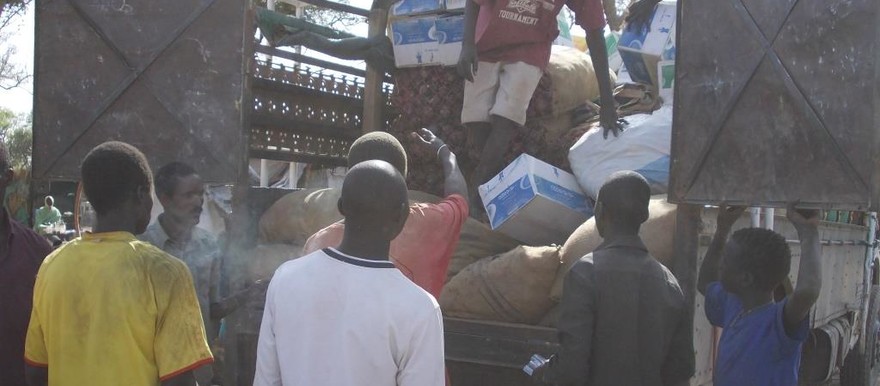First fruits of the Sudan-South Sudan cooperation agreement were seen Tuesday in Yida refugee camp, where several lorries arrived via a north-western border crossing of Unity State carrying basic commodities.
The road was officially opened for traders last Friday when the Sudanese president visited to Juba. Direct southward trade to the camp is still impeded by civil war in the Nuba Mountains region, but crossings elsewhere in South Sudan are opening.
Speaking to Radio Tamazuj in the camp market, a trader by the name of Aldow Abdel-Ghadir said that they have seen some improvements on the ground along the border between the two nations.
He explained that he exported his goods a long distance in Kordofan in Sudan: “I am exporting these goods from North Kordofan through Abu Zabad and al-Fula.”
“We are very pleased with cooperation agreements signed between the two countries because we are now free – no intimidation, attacks and obstacles along the roads to South Sudan,” he said
Nonetheless, many payments are necessary along the route, mainly in the Muglad area of Sudan, according to Abdel-Ghadir. “We are facing obstacles in the areas in the border with Sudan, the Sudanese territory especially in Muglad where Misseriya collect from us a lot of money.”
The trader accused the Misseriya there of opening many checkpoints to make money. “They opened many checkpoints on the way at which the traders have to pay an amount – and if you don’t pay them then they shoot and loot your convoy”
The trader pointed out that such incidents are mostly between Diffra in western Kordofan and Mayom County of Unity State.
“The Misseriya Arabs are migrating with their guns and cattle. They demand an amount ranging from one to thousand Sudanese pounds.” The checkpoints on roads are their illegally without official documents or receipt, he added.
On the southern side there are fewer demands for payment. Only border tax is paid at the entrance to Mayom area and then upon arrival at town markets.
The trader said that they cannot complain to their government. “We can’t say something to the Sudan government because they will threaten us saying that we were not the ones who send you to South Sudan,” he said.
The trader pointed out that the closure of the border had affected their business and many of their fellow traders were killed or robbed when they tried to smuggle goods to South Sudan during that time.
“With these agreements everybody is happy. Even our families they don’t get worried when somebody is coming to South Sudan because there is no obstacles on the roads due to these cooperation agreement,” he said.
Meanwhile, prices have dropped also at markets elsewhere in the state. Traders in Rubkona told Radio Tamazuj that the price of a sack of sugar dropped from 450 to 350 South Sudanese pounds, sorghum from 540 to 500 SSP, onions from 1000 to 450 and cooking oil from 250 to 200 per jerrycan.




